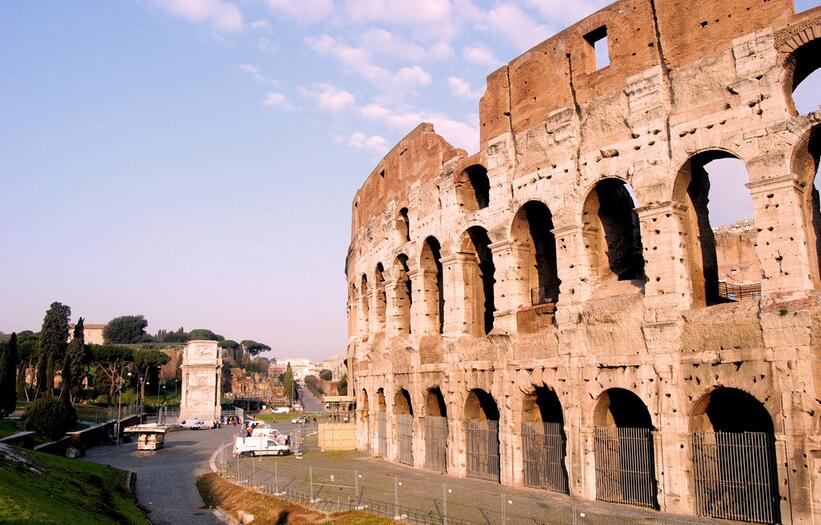The question is how true was this?
問題是 這種說法到底有多正確呢?
Segment 12 b Pax Romano
12b 羅馬和平時期
The Latin term Pax Romano can be translated as roman peace.
拉丁語Pax Romano可以譯為羅馬和平。
More specifically it means two centuries of comparative peace and prosperity,
更確切地說,它的意思是兩個世紀(jì)長的相對和平和繁榮,
which began with Augustus in 31 BC and ended with the fall of the Severin dynasty in 235 AD.
始于公元前31年奧古斯都皇帝,終于公元235年塞維魯王朝的衰亡。
The use of the word Pax or peace might imply the absence of wars.
和平這個詞也就意味著沒有戰(zhàn)爭。

In fact there were almost always wars on one border or another and even a brief civil war.
但事實上,邊境地區(qū)總是有戰(zhàn)火的,甚至還會有短暫的內(nèi)戰(zhàn)。
Yet the Roman Empire now including the entire Mediterranean world, was far more peaceful and stable than it had ever been during the republic.
不過現(xiàn)在羅馬帝國已經(jīng)吞并了整個地中海地區(qū),要比共和國時期和平穩(wěn)定得多。
Moreover the subject peoples of the roman world truly became Romanized during this time.
此外,羅馬世界的子民在這個時期真正地羅馬化了。
The roman legal system ensured the rule of law,
羅馬的法制體系確保了依法治國,
the roman army kept the borders safe from marauders and the roman navy kept the seas free from pirates.
羅馬軍隊保護邊境地區(qū)不受擄掠者侵襲,羅馬海軍則保護海洋不受海盜襲擊。
Attention to the needs of all the people in the provinces as well as in Italy kept the empire remarkably free from social disorder.
政府不僅注意意大利人民的需求,也考慮各個行省的需求,極大地保證了社會安定。
Even the so-called year of the four emperors 68 to 69 AD merely interrupted the series of order and prosperity
甚至是公元68到69年,所謂的四帝之年也只是暫時擾亂了社會秩序和繁榮
instead of stopping the principate in its tracks.
而沒有終結(jié)元首統(tǒng)治。
Rome's territorial gains were very modest during the time of the Pax Romano.
在羅馬和平時期,羅馬地域上的擴張非常少。
Augustus had hoped to extend Rome's influence in Germany beyond the Rhine.
奧古斯都希望將羅馬的勢力擴張到萊茵河之外的德國地區(qū),但是卻招致了相反結(jié)果。
His efforts backfired in 9 AD when Herman the German annihilated three roman legions at Tuiterbergvault.
公元9年,德國軍隊在條頓森林戰(zhàn)役中殲滅了三個羅馬兵團。
This defeat at Tuiterbergvault made him advise Tiberius to keep the empire's boundaries right where they were
正是由于這次敗仗,他建議提比略停止擴張帝國的疆域,
and to focus on keeping on what Rome had already gained.
側(cè)重于守衛(wèi)疆土即可。
Most of the imperial army of 150 000 men was kept busy on those borders not defined by the sea, the desert or the great rivers.
15萬軍隊中絕大部分都被派到海洋,沙漠或者大河的邊境地區(qū)戍守行軍。
They marched, they drilled and they built fortifications.
演習(xí)并且建筑防御工事。
The Rhine and the Danube valleys would always remain hot spots and sometimes required additional forces, as did the restless Jews of Judea.
萊茵河和多瑙河地區(qū)總是熱點地區(qū),有時候需要增援兵力,猶太人也是一樣。
Over time Britain, Arabia and Dacia that is modern day Romania were added to the empire and a handful of client kingdoms were annexed.
漸漸地,英國,阿拉伯和相當(dāng)于今天的羅馬尼亞地區(qū)的達契亞都被并入了羅馬帝國 同時羅馬也吞并了少數(shù)附庸國。
For the most part though Rome focused upon developing internal stability.
但是羅馬最主要的還是著重于國內(nèi)的穩(wěn)定。
More and more provincials won the full Roman citizenship and many of the more enterprising provincials actually found their way to Rome, which had become virtually the capital of the Mediterranean world.
越來越多的行省獲得了完全的羅馬公民權(quán),而一些更進取的行省事實上也找到了通向羅馬的大路,當(dāng)時羅馬已經(jīng)成了地中海世界的首都。



